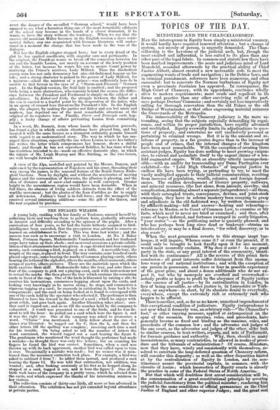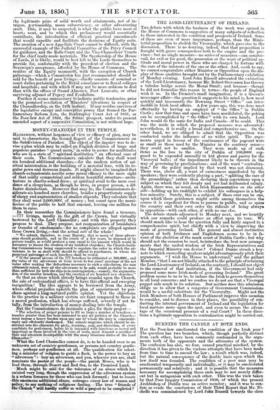TOPICS OF THE DAY.
MINISTERS AND THE CHANCELLORSHIP.
HAD the interregnum in Equity been simply a ministerial vacancy, it would hardly have required renewed attention ; but a change of system, not merely of person, is urgently demanded. The Chan- cellorship is the keystone of the judicial arch, but, :though the most exalted and infiuentid, is less suited to its place than any other part of the legal fabric. In common and. statute law there have been marked improvements : the acute and judicious mind of Lord Mansfield, seconded afterwards by the practical ability of Chief Justice Abbott, almost created a new mercantile oode to meet the augmenting wants of trade and navigation ; in the Debtor laws, and in crimin' al punishment, reformers have been numerous, aud often successful: but to renovate the Norman barbarisms of Equity not even a proximate Justinian has appeared. In consequence, the High Court of Chancery, with its appendants, continues wholly alien to modern requirements ; more crude and repellent in its forms and practice than any other surviving relic of the ,past, save perhaps Doctors' Commons ; and certainly not less imperatively calling for thorough renovation than the old Palace or the old Bridge of Westminster, or that other engrossing material nuisance the Gtraveyards of the Metropolis. The immoveability of the Clianeery judiciary is the more as- tounding, seeing that the subjects especially demanding its cogni- zanCe, and witlun its proper jurisdiction, have rapidly • advanced and multiplied. Equity avowedly limits its adjudications to ques- tions of property, and entertains no snit exchisively"personal or pertaining to criminal wrongs. But it LS in'the amount and re- lations of property, in a far greater degree than in the increase of people and of crimes, that the internal changes of the -kingdom have been most remarkable. With the exception of creating three assistant-judges, Equity has done nothing to meet growing exigen- cies, to extend and assimilate itself to the urgent claims of 'a ten- fold augmented empire. With an absurdity utterly incomprehen-
sible—wi av th an ility far transcending any Paine Partingten ever
exhibited—the "Lord High Obstacles" of imperial justice in endless'. file have been trying, or pretending to try, to meet the vastly multiplied appeals to their judicial commiseration, resulting from increase of population, wealth, colonies, and foreign depend- encies. The sudden development of literary property, railways, and mineral resources, (the last alone, from amount; novelty, nd complication, demanding almost a separate jurisprudence)— allihese, with their entangled trusts, conveyances, devises, and joint-stock ownerships, they have in solemn mockery been essaying to grasp and adjudicate in the old fashioned way; by written docunients--- by affidavit-making—bill and answer--hearing and rehearing-- reference to Master, or to Court of Common Law, to examine or try facts, which next to never are tried or examined ; and then after years of hopes deferred, and fortunes swamped in costly litigation, your orator "—so the petitioning suitor is quaintly phrased, and who has perhaps been long since dead or bankrupt—obtains an interlocutory, or may be a find decree, "for relief, discovery, or to
stay waste' !
'When the next generation reverts to this strange inapt bur- lesque, it will inquire, Whence came it ? or even the present, if it could only be brought to look fixedly upon it for one moment, would most assuredly exclaim, Why does it exist Is any great party in the state, or any great interest of the commtmity, identi- fied with its continuance? All is the reverse of this pariah fade conclusion ; all great interests suffer detriment from this anoma- lous warp of our national institutions ; and with the exception of one person in possession, and three or four in possible expectancy of the great prize, and about a dozen additionals who do not ex- pect it, but who by monopoly are overfeed and overworked— nobody profits or hopes to profit by the abeyance of Equity justice —the essence of all justice—by its centralization' in London, in lieu of being accessible, as other justice is, in Lancashire or York- shire, or anywhere—in short, by its absolute denial to eve everywhere, except the extremely rich or extremely rash who ha en to be affluent.
ereis another, and, so far as we know, unnoticed impeachment of this exceptional condition of judicature. Equity jurisprudence is not now what it formerly was, an arbitrary rule—" the Chancellor's foot," or other varying measure, applied or extemporized on the spur of the occasion. Its maxims, rules, and precedents, have generally become as fixed and binding as the maxims, mike, and precedents of the common law; and the advocates and judges of the one court, as the advocates and judges of the other, alike look to similar sources, to text-writers, reports, and acts of Parliament, for forensic guidance and authority. Why, then, should so many inconsistencies' so many contrarieties be allowed in modes of proce- dure and the tribunals of administration? Of course, Ministers, now that they have, wisely and consistently with themselves, re- solved to entertain the long-deferred question of Chancery reform, will consider this disparity; as well as the other disparities hinted at by the centralization of Equity in London, and ita non- itinerancy nearer the provincial capitals, in common with the circuits of Assize; which locomotion of Equity courts is already the practice in some of the Federal States of North America.
But that which -will doubtless first arrest consideration will be, the consummation of a great constitutional principle by severing the judicial functionary from the political minister ; rendering him subject to the same conditions of official permanence as the Chief Justice of England and other superior Judges; and the great seal
the legitimate prize of solid worth and attainments, not of in- trigue, partisanship, mean subserviency, or other adventuring craft. This, it may be suspected, is what the public have most at heart; next, and to which this preliminary would essentially contribute, the introduction of efficient practical amendments that would expedite and facilitate the decisions of Equity- suits. The creation of a new Appellate Court cannot be difficult, with the successful example of the Judicial Committee of the Privy Council for guidance; "and the Rolls Court and the Vice-Chancellors' Courts for the chief ready-made materials. The Speakership of the House of Lords, it is likely, would be best left to the Lords themselves to provide for, conformably with the precedent of election and the Sovereign's acceptance, afforded by the House of Commons. The residue of the Equity mammoth, with the exception of Church patronage—which a Commission has just recommended should be sold for the benefit of poor livings -chiefly consists of nominal or court duties pertaining to the Royal conscience or to Royal colleges and hospitals ; and with which it may not be more arduous to deal than with the offices of Grand Almoner, Poet Laureate, or other suryiving adjunct of Popery and Feudalism. Further it seems unneeessar to indicate public tendencies, prior to the promised revelation of I sters' intentions in respect of the Chancellorship, on the 24th • t, If any residue survives of the legislative energy and coned e power that framed the Par- liamentary Reform Acts, the Bankruptcy Court Act of 1831, or the Poor-law Act of 1834, tlie'Ai'tare prospect, under its present amended aspect of a suspensive Commission, is not without hope.



























 Previous page
Previous page